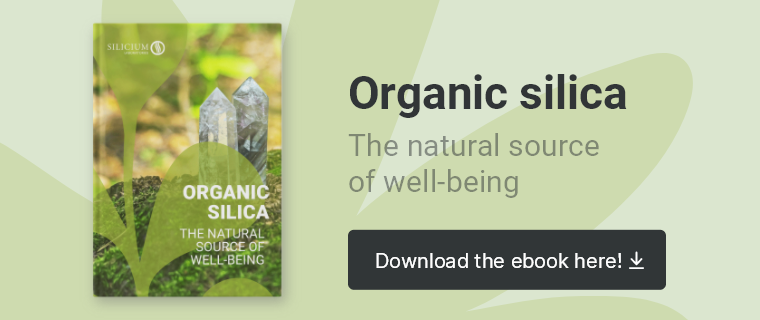
Consequences of a lack of silica in the body – how can you avoid them?
Consequences of a lack of silica in the body – how can you avoid them?
A lack of silica in the body produces obvious symptoms. We are talking about a trace element that is essential for health. It is involved in the synthesis of natural collagen and thus helps various tissues and organs to function properly. Bones, muscles, cartilage, skin, blood vessels, brain, etc.
Over the years, especially after the age of 35-40, collagen deposits in the body decrease and the risk of collagen deficiency increases.
Do you want to stay young and healthy despite the passing of time? Then stick around until the end, you’re going to like this.
Today we tell you…
- What causes a lack of silicon in the body?
- What are the symptoms of a lack of silicon in the body?
- How to avoid silicon deficiency?
What causes a lack of silica in the body?
Organic silica deficiency used to be rare. This has changed due to today’s eating habits: we consume less “real” (natural, fresh) food and more ultra-processed foods (lacking in silicon).
Moreover, this mineral is largely obtained from plant sources, and in today’s crops its concentration is much lower than it was years ago. Why? Because of the use of synthetic fertilisers, pesticides and other chemicals.
On top of that, when we cook our food, we lose almost all of what little we do get.
Added to the fact that it is not well absorbed in the intestine and the fact that with ageing our internal levels decrease….
It turns out that it is no longer so rare to have a deficiency.
What are the symptoms of a lack of silica in the body?
The various properties of organic silica in the body explain the consequences of a deficiency. Most of them are due to reduced collagen production:
- Appearance of wrinkles and sagging skin due to loss of elasticity and firmness.
- Excessive wear and tear of joints. Increases the possibility of suffering from diseases such as arthritis and osteoarthritis.
- Bone weakness. Bone formation is altered, increasing the risk of osteoporosis and fractures.
- Most frequent sports injuries: sprains, tendinitis, etc. This is the result of the reduced capacity for regeneration of muscle fibres.
- Dull hair and hair loss.
- Brittle nails and sensitive teeth.
- Greater probability of suffering from cardiovascular pathologies (atherosclerosis, heart attacks, etc.) and neurodegenerative diseases (Alzheimer’s, Parkinson’s, etc.).
- Difficulty in healing wounds and burns.
- Itching and mild eczema (dermatitis).
How can silica deficiency be avoided?
With fresh plant products
Despite the complications of getting it through diet, it is still important to consume foods with silica.
The UNED recommends a daily intake of 15-35mg, while the Expert Committee on Vitamins and Minerals states that the maximum tolerable intake is 760mg/day.
Whole grains (oats, wheat, barley, rye, etc.) contain a good amount of this micronutrient.
Citrus fruits, apples, strawberries, bananas, cherries, grapes, avocado, etc. also contain a good amount of this micronutrient. Wash them carefully and eat them with the skin on whenever possible to get the most out of them.
Other vegetable sources include vegetables (especially potatoes), greens (spinach, artichokes, chard, etc.), nuts (walnuts, almonds, etc.), seeds, pulses, parsley, seaweed and soya.
Choose what you drink wisely
Fun fact: beer is high in silica. If you are a beer drinker, your eyes may be glazing over, but remember that alcohol is not good for you. Moderate your consumption and choose the 0 versions.
Mineral water can also have a certain concentration, but much depends on its composition and the region it comes from.
And don’t forget that medicinal plants such as horsetail, nettle and bamboo also contain it. Include them in your daily life in herbal teas and they will help you to combat the lack of silicon in your body.
Supplement wisely
A good diet is necessary. However, due to the reasons I mentioned above, it is not enough to prevent a deficiency of this mineral. Even less so after the age of 40, at which point our internal stores slowly start to fall.
The best way to ensure adequate levels is with a supplement that also provides all the benefits of organic silica.
But not just any supplement. Consider what I explained above: this trace element is poorly absorbed.
In other words, if the formula is not designed for good assimilation, it’s like not taking anything at all.
In other words, you would be throwing your money away.
You have two alternatives with which you don’t have to worry about it:
- Silicium G7 Original Bio-dynamised. It is produced in such a way that bioavailability is very high. In other words, penetration and fixation in the tissues is very fast and effective.
- Living Silica Collagen Booster. This is the most advanced formulation of organic silicon available today. Not only is it highly concentrated, but it also has up to 10 times higher absorption than other similar products. It also contains acacia gum, which has prebiotic effects.
Both are excellent options for preventing silicon deficiency in the body. Combine them with that proper diet I was telling you about, and you will see how your health (and beauty, why not say it) will be preserved even as the years go by.





